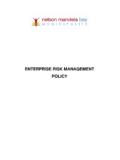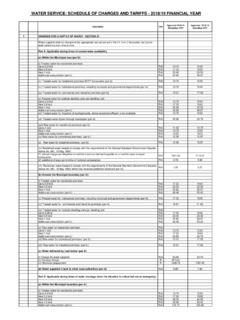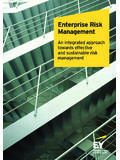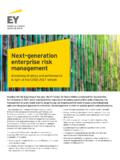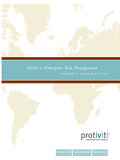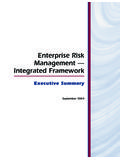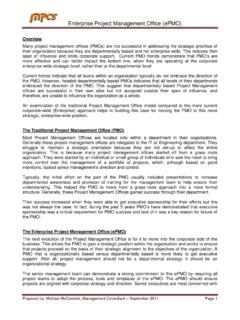Transcription of Risk Management Policy - Welcome to Nelson …
1 enterprise RISK Management Policy TITLE OF Policy enterprise Risk Management Policy Policy OWNER Office of the Chief Operating Officer Policy CHAMPION Chief Risk Officer DOCUMENT HISTORY: Policy Title Status (current, revised, no change, redundant) Approving Authority Decision date Resolution No. Ref No. Doc No. Pending date for next revision enterprise Risk Management Policy Current Council 13 Nov 2014 Unknown 2/P N/A 13 Nov 2017 TABLE OF CONTENTS 1. DEFINITIONS .. 1 2. enterprise RISK Management Policy STATEMENT .. 2 3. REGULATORY FRAMEWORK .. 4 CONSTITUTION OF THE REPUBLIC OF SOUTH AFRICA, ACT 108 OF 1996 .. 4 PUBLIC SERVICE REGULATIONS .. 4 LOCAL GOVERNMENT: MUNICIPAL FINANCE Management ACT 56 OF 2003.
2 4 4. Policy PRINCIPLES .. 6 5. Policy OBJECTIVES .. 6 6. Policy SCOPE AND APPLICATION .. 7 6 enterprise -WIDE RISK Management MATRIX .. 7 RISK Management WITHIN THE CONTEXT OF BUSINESS OBJECTIVES .. 7 enterprise RISK Management PROCESS .. 8 ALIGNMENT OF OBJECTIVES AND enterprise -WIDE RISK Management COMPONENTS .. 9 RISK APPETITE .. 10 RISK ARCHITECTURE .. 10 RISK ASSESSMENT .. 10 RISK PROTOCOLS .. 12 RISK RESPONSE .. 13 ROLES AND RESPONSIBILITIES .. 13 LIMITATIONS OF RISK Management .. 15 LEARNING AND BENCHMARKING .. 15 7. IMPLEMENTATION PROCEDURES .. 16 8. MONITORING AND EVALUATION .. 17 INTERNAL MONITORING .. 17 EXTERNAL MONITORING .. 18 9. Policy REVIEW .. 18 10. 19 1 1. DEFINITIONS In this Policy , unless the context indicates otherwise, Architecture means a framework that incorporates various interrelated and inter-dependent components into a risk Management system; City Manager refers to the Accounting Officer as defined in terms of the Local Government: Municipal Finance Management Act 56 of 2003 in relation to a municipality.
3 Council refers to the council of the Nelson Mandela Bay Metropolitan Municipality as established in terms of section 18 of the Local Government: Municipal Structures Act 117 of 1998 enterprise Risk Management means a process, effected by the Municipality and its entities, applied in strategy setting and across the enterprise , designed to identify potential events that may affect the Municipality and its entities, and manage risk to be within its risk appetite, to provide reasonable assurance regarding the achievement of its objectives; Municipality means the Nelson Mandela Bay Metropolitan Municipality, a Category A municipality established in terms of Part 2 of Schedule 1 of Notice 85 in the Eastern Cape Provincial Gazette No. 654 on 27 September 2000 promulgated in terms of Section 12(1) of the Local Government: Municipal Structures Act 117 of 1998, for the municipal area described in such Notice; Risk means an event with a negative impact, which can prevent the achievement of strategic organisational objectives; Risk appetite means the amount of risk which the Municipality is generally willing to accept in striving for value; 2 Risk assessment means the process of determining the probability, as well as the impact of the identified risk as a basis of determining how these risks should be managed.
4 Risk Management means a method of identifying, analysing, assessing, treating, monitoring and communicating risks associated with any activity, function or process that will enable the Municipality to maximise opportunities and minimise losses; Risk register means a record of all relevant information relating to the identification and Management of risks ; Risk response means a set of actions avoiding, accepting, reducing, or sharing risk developed in order to mitigate the identified risks . 2. enterprise RISK Management Policy STATEMENT The City Manager commits the Municipality to a process of risk Management that is aligned to the principles of good corporate governance, as supported by the Municipal Finance Management Act 56 of 2003 (MFMA) and various other pieces of legislation applicable to local government.
5 Risk Management is recognised as an integral part of responsible Management and the Municipality therefore adopts a comprehensive approach to the Management of risk. The features of this process are outlined in the Municipality s Risk Management Strategy. It is expected that all Directorates, Sub-directorates, units, operations and processes will be subject to the Risk Management Strategy. It is the intention that these Directorates, Sub-directorates and Units will work together in a consistent and integrated manner, with the overall objective of reducing risk, as far as reasonably practicable. Effective risk Management is imperative to the Municipality to fulfil its mandate, the service delivery expectations of the public and the performance expectations within the institution itself.
6 The realisation of the Municipality s strategic plan depends on 3 the institution being able to take calculated risks in a way that does not jeopardize the direct interests of stakeholders. Sound Management of risk will enable the Municipality to anticipate and respond to changes in its service delivery environment, as well as make informed decisions under conditions of uncertainty. The Municipality therefore subscribes to the fundamental principles that all resources will be applied economically to ensure: (a) The highest standards of service delivery. (b) A Management system containing the appropriate elements aimed at minimizing risks and costs in the interest of all stakeholders. (c) Education and training of all our staff to ensure continuous improvement in knowledge, skills and capabilities which facilitate consistent conformance to the stakeholders expectations.
7 (d) Maintaining an environment that promotes the right attitude and sensitivity towards internal and external stakeholder satisfaction. An entity-wide approach to risk Management will be adopted by the Municipality, which means that every key risk in each part of the Municipality will be included in a structured and systematic process of risk Management . It is expected that the risk Management processes will become embedded into the Municipality s systems and processes thus ensuring that our responses to risk remain current and dynamic. All risk Management efforts will be focused on supporting the Municipality s objectives. Equally, they must ensure compliance with relevant legislation and fulfil the expectations of employees, communities and other stakeholders in terms of good corporate governance.
8 The effectiveness of our efforts to entrench a culture of risk Management entity-wide rests entirely on the commitment of all political office bearers, municipal officials and agents acting on behalf of Council. Commitment to risk Management is a sure expression of commitment to Batho Pele principles. 4 3. REGULATORY FRAMEWORK Constitution of the Republic of South Africa, Act 108 of 1996 (Constitution) Section 195 of the Constitution emphasises the values and principles underpinning public administration, which include the efficient, economic and effective use of resources in the public sector. Planning is very important in clarifying the intentions of Government in the medium term; facilitating the allocation of budgets according to priorities; monitoring results and enforcing accountability in the whole of Government.
9 Embedded within this planning framework is an internal control and risk Management framework that serves to ensure that public service organisations achieve their outcomes. Risk Management is undoubtedly one of the most important Management tools during an era of public service reforms. Public Service Regulations In addition to the constitutional provisions, the National Treasury s Public Sector Risk Management Framework provides for the implementation of an enterprise risk Management framework for the entire public service. Local Government: Municipal Finance Management Act 56 of 2003 (MFMA) The MFMA sets out the roles and responsibilities of the key stakeholders within the risk Management process as follow: Accounting Officer Section 62 of the MFMA requires that: 5 (1) The accounting officer of a municipality is responsible for managing the financial administration of the municipality, and must for this purpose take all reasonable steps to ensure- (c) that the municipality has and maintains effective, efficient and transparent systems- (i) of financial and risk Management and internal control Management , Chief Risk Officer, Risk Specialists and Other Personnel In terms of section 78 Management responsibilities are extended to all senior managers and other officials of municipalities.
10 This implies that responsibility for risk Management vests at all levels of Management and personnel and is not limited to only the City Manager, the Risk Management Unit or Internal Audit Division. Internal Audit Section 165 of the MFMA requires that: (2) The internal audit unit of a municipality or municipal entity must (a) prepare a risk based audit plan and an internal audit program for each financial year; (b) advise the accounting officer and report to the audit committee on the implementation on the internal audit plan and matters relating to: (iv) risk and risk Management ." Audit Committee Section 166 (2) of the MFMA states: "(2) An audit committee is an independent advisory body which must (a) advise the municipal council, the political office-bearers, the accounting officer and the Management staff of the municipality, or the board of directors, the accounting officer and Management staff of the municipal entity, on matters relating to - (ii) risk Management .
